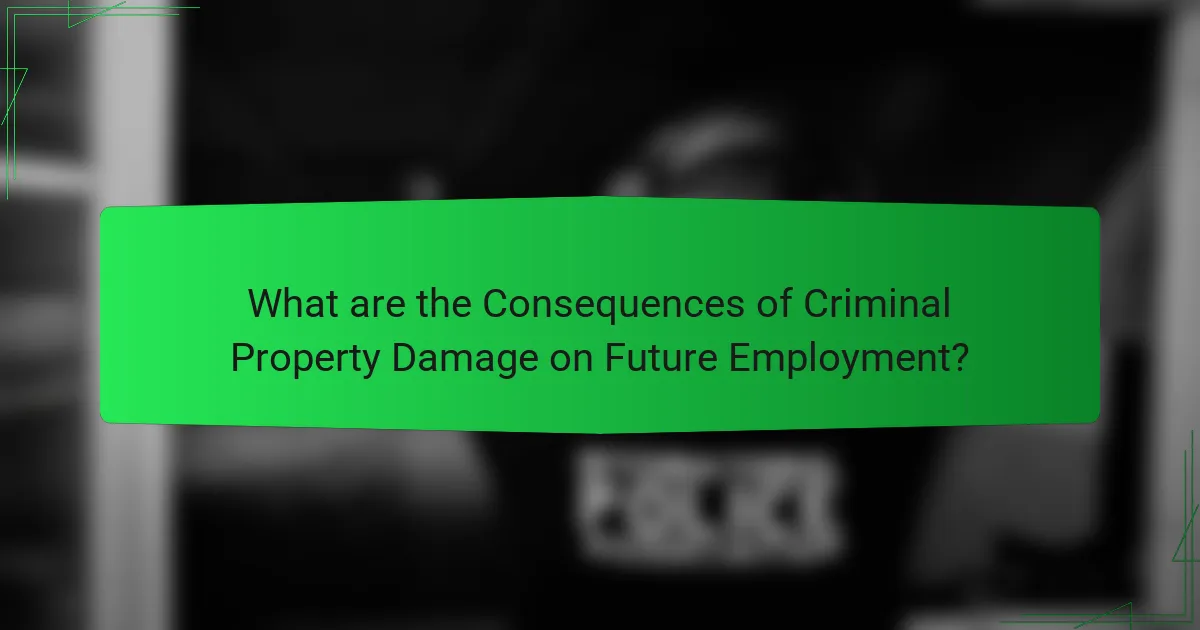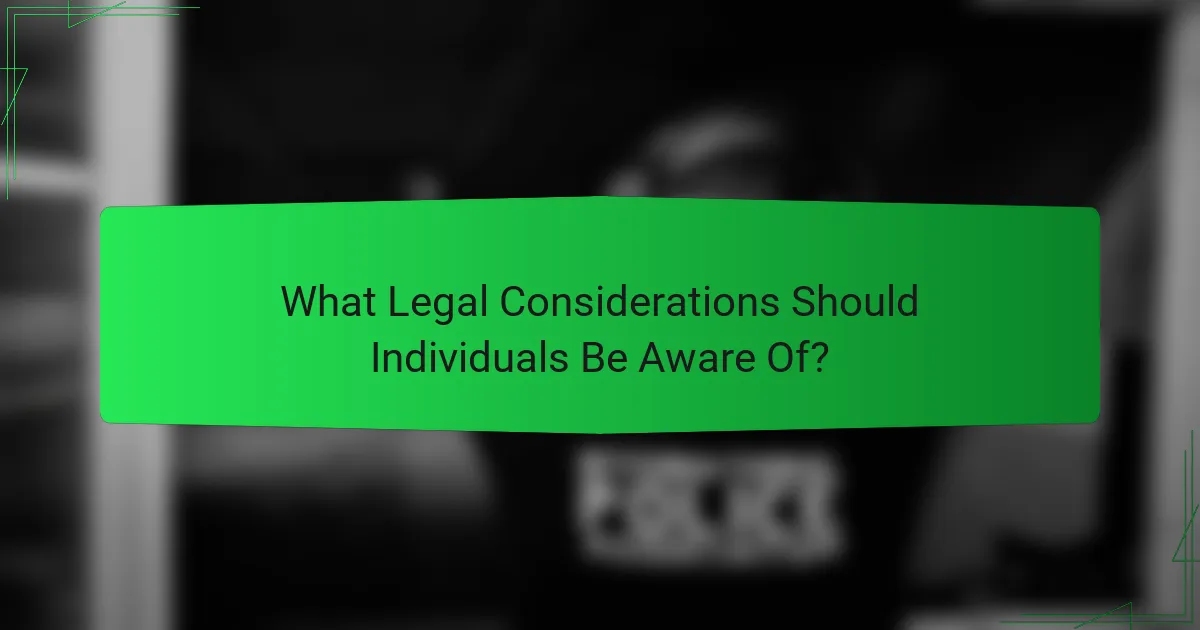Criminal property damage refers to the intentional destruction or defacement of someone else’s property, and it can have significant repercussions on future employment opportunities. A criminal record resulting from such actions can lead to negative perceptions of an individual’s reliability and trustworthiness, often resulting in fewer job offers or outright rejections from potential employers. Certain industries, particularly finance and education, maintain strict hiring policies regarding criminal records, further complicating the job search for affected individuals. Legal consequences may include criminal charges, fines, or civil liability for damages, making it essential to understand local laws and seek legal advice. Strategies for mitigating the employment impact of criminal property damage include focusing on rehabilitation, skill development, community service, and building a positive online presence.

What are the Consequences of Criminal Property Damage on Future Employment?
Criminal property damage can significantly impact future employment opportunities. Employers often conduct background checks that reveal criminal records. A history of property damage may lead to negative perceptions regarding reliability and trustworthiness. This can result in fewer job offers or rejections during the hiring process. Additionally, certain industries may have stricter hiring policies concerning criminal records. For instance, positions in finance or education often require clean records. The stigma associated with criminal behavior can persist, affecting long-term career progression. Studies indicate that individuals with criminal records face higher unemployment rates compared to those without.
How can a criminal record impact employment opportunities?
A criminal record can significantly limit employment opportunities. Many employers conduct background checks during the hiring process. A record may lead to automatic disqualification for certain positions. Industries such as education, healthcare, and finance often have stricter policies. Research shows that individuals with criminal records face higher unemployment rates. According to a study by the National Employment Law Project, applicants with records are often overlooked, even for minor offenses. This discrimination can persist despite qualifications and experience. Additionally, some states have laws that allow employers to inquire about criminal history. This can further hinder chances for job seekers with a record.
What specific types of property damage lead to criminal records?
Vandalism, arson, and burglary are specific types of property damage that can lead to criminal records. Vandalism involves intentionally damaging someone else’s property, such as graffiti or breaking windows. Arson is the willful act of setting fire to property, which poses significant risks to safety and can lead to severe legal consequences. Burglary includes illegally entering a building with the intent to commit theft or another crime, resulting in property damage during the process. Each of these actions is classified as a criminal offense in many jurisdictions, leading to potential arrest, charges, and a criminal record.
How do employers view criminal records related to property damage?
Employers often view criminal records related to property damage as a significant concern. Such records may indicate a lack of responsibility or reliability. Many employers conduct background checks during the hiring process. A history of property damage can raise red flags about a candidate’s behavior. According to a survey by the Society for Human Resource Management, 92% of employers check criminal records. This suggests that criminal history can impact hiring decisions. Some industries may be more stringent, especially those involving security or trust. Ultimately, the context of the offense and how long ago it occurred also play a role in employer perceptions.
Why is understanding legal considerations important for affected individuals?
Understanding legal considerations is crucial for affected individuals to navigate their rights and obligations. Legal knowledge helps individuals assess their situation accurately. It enables them to make informed decisions regarding potential legal actions. Awareness of legal implications can prevent further legal complications. Additionally, understanding the law can aid in negotiating settlements or plea deals. It also empowers individuals to seek appropriate legal representation. Informed individuals are better positioned to protect their interests. Ultimately, legal understanding can significantly influence the outcomes of their cases and future opportunities.
What legal rights do individuals have after being charged with property damage?
Individuals charged with property damage have the right to legal representation. This right ensures they can defend themselves in court. They also have the right to remain silent during police questioning. This protects them from self-incrimination. Additionally, individuals have the right to a fair trial. This includes the right to present evidence and witnesses. They can challenge the evidence against them. Furthermore, individuals have the right to appeal a conviction. This allows them to seek a review of the case. These rights are protected under the Sixth Amendment of the U.S. Constitution.
How can individuals navigate the legal system regarding property damage charges?
Individuals can navigate the legal system regarding property damage charges by understanding their rights and the legal process. First, they should gather all relevant evidence, such as photographs and witness statements. This documentation will support their case. Next, individuals must determine whether to seek a plea bargain or go to trial. Consulting with a legal professional is advisable for informed decisions. They should also be aware of statutes of limitations for filing claims or defenses. Understanding local laws is crucial, as regulations can vary significantly by jurisdiction. Engaging in mediation or settlement discussions may offer a quicker resolution. Finally, individuals should keep records of all communications related to the case for future reference.
What are the potential long-term impacts on employment from property damage charges?
Property damage charges can lead to significant long-term impacts on employment. Individuals with such charges may face difficulties in securing jobs. Many employers conduct background checks that reveal criminal records. A property damage charge can be viewed negatively by potential employers. This perception may limit job opportunities in various sectors. Additionally, certain professions may have stricter hiring policies regarding criminal history. The stigma associated with property damage charges can affect an individual’s self-esteem and confidence. As a result, these factors can hinder career advancement and job stability over time.
How does the severity of the crime affect future employment prospects?
The severity of a crime significantly impacts future employment prospects. More severe crimes often lead to harsher penalties and longer-lasting stigma. Employers frequently conduct background checks. A felony conviction can disqualify candidates from many positions. Research shows that individuals with serious offenses face higher unemployment rates. According to a 2018 study by the National Institute of Justice, 60% of employers are reluctant to hire individuals with felony records. Conversely, minor offenses may have a less detrimental effect. However, even misdemeanor convictions can raise concerns about reliability and trustworthiness. Overall, the severity of the crime directly correlates with challenges in securing employment.
What industries are most affected by criminal property damage records?
The industries most affected by criminal property damage records include real estate, construction, and insurance. These sectors face increased scrutiny when hiring employees with such records. Real estate companies often require background checks for property management roles. Construction firms may avoid hiring individuals with a history of property damage due to liability concerns. Insurance companies assess risk based on criminal records, impacting policy rates and approvals. Additionally, retail businesses may experience higher theft rates, leading to increased security measures. Overall, a criminal property damage record can significantly hinder employment opportunities across these industries.

What Legal Considerations Should Individuals Be Aware Of?
Individuals should be aware of the legal repercussions of criminal property damage. Such actions can lead to criminal charges, which may result in fines or imprisonment. A criminal record can significantly impact future employment opportunities. Employers often conduct background checks, and a record may disqualify candidates. Additionally, civil liability may arise, requiring individuals to compensate for damages. Understanding local laws is crucial, as penalties vary by jurisdiction. Seeking legal advice can help navigate potential consequences effectively.
How does expungement of criminal records work?
Expungement of criminal records is a legal process that removes or seals a person’s criminal record. This process typically involves filing a petition in court to request the expungement. The individual must meet specific eligibility criteria, which can vary by jurisdiction. Common requirements include a waiting period, completion of the sentence, and no subsequent offenses. After filing, the court reviews the petition and may hold a hearing. If granted, the expungement order is issued, effectively erasing the criminal record from public view. This process can significantly improve an individual’s employment prospects, as many employers conduct background checks. In the United States, laws governing expungement differ by state, impacting the process and eligibility.
What steps are involved in the expungement process for property damage offenses?
The expungement process for property damage offenses involves several key steps. First, an individual must determine eligibility for expungement based on state laws. Next, they need to gather all relevant documents related to the offense. This includes court records and proof of rehabilitation if applicable. After that, the individual must complete the expungement petition form specific to their jurisdiction. Following this, the completed petition is filed with the appropriate court. A hearing may then be scheduled where the individual can present their case. Finally, if the court grants the expungement, the individual will receive an order to have the record sealed or erased. Each step is crucial to successfully navigating the expungement process.
What are the eligibility criteria for expungement?
Eligibility criteria for expungement vary by jurisdiction. Generally, individuals must have completed their sentence, including probation and parole. The offense must typically be a misdemeanor or a non-violent felony. Additionally, there should be no pending criminal charges against the individual. Some jurisdictions require a waiting period after the completion of the sentence. Certain serious offenses, such as violent felonies, are often excluded from eligibility. Furthermore, individuals must demonstrate rehabilitation and a lack of subsequent criminal behavior. These criteria ensure that only those who have shown accountability can seek expungement.
What are the implications of background checks for job applicants?
Background checks for job applicants can significantly affect hiring decisions. Employers use these checks to verify an applicant’s criminal history, employment history, and educational qualifications. A negative finding can lead to disqualification from a position. According to a 2018 study by the Society for Human Resource Management, 70% of employers conduct background checks. This practice aims to reduce potential risks associated with hiring. Furthermore, background checks can impact an applicant’s privacy rights. Inaccurate information can lead to wrongful rejections, highlighting the need for accuracy in reporting. Overall, background checks serve as a tool for employers to ensure a safer workplace while also presenting challenges for applicants.
How do employers conduct background checks related to criminal records?
Employers conduct background checks related to criminal records by utilizing databases and third-party services. These checks typically include searching national, state, and local criminal record databases. Employers may also verify court records for specific criminal convictions. The process often requires the applicant’s consent due to privacy laws. Many employers use services like the National Criminal Database or local police department records. The Fair Credit Reporting Act (FCRA) regulates how employers can obtain and use this information. Employers must inform applicants if they take adverse action based on the background check findings. This process ensures employers comply with legal requirements while assessing potential hires.
What rights do individuals have regarding disclosure of criminal history?
Individuals have specific rights regarding the disclosure of their criminal history. These rights vary by jurisdiction but generally include the right to access their own criminal records. Individuals can request copies of their records from law enforcement agencies. They may also have the right to contest inaccuracies in their records. In many places, individuals can limit the disclosure of certain convictions after a specified period. Laws such as the Fair Credit Reporting Act regulate how employers can access and use criminal history information. Additionally, some states have “ban the box” laws that prevent employers from asking about criminal history on initial job applications. These rights aim to protect individuals from discrimination based on past criminal behavior.

What Strategies Can Individuals Use to Mitigate Employment Impacts?
Individuals can mitigate employment impacts from criminal property damage by focusing on rehabilitation and skill development. Engaging in community service demonstrates a commitment to change. Pursuing education or vocational training can enhance employability. Networking with professionals in desired fields can open job opportunities. Seeking legal advice may help in understanding rights and options. Building a positive online presence can counteract negative perceptions. Volunteering can showcase reliability and character. These strategies collectively improve job prospects and reduce stigma.
How can individuals present their criminal history to potential employers?
Individuals can present their criminal history to potential employers by being honest and transparent. It is crucial to disclose relevant convictions during the application process. Many employers conduct background checks, making honesty essential. Individuals should prepare to explain the context of their criminal history. This includes discussing rehabilitation efforts and changes made since the conviction. Providing references or documentation of positive changes can strengthen their case. In some cases, individuals may benefit from seeking legal advice on expungement options. Research indicates that employers value honesty and personal growth in candidates with criminal backgrounds.
What are effective ways to explain past property damage charges during interviews?
Be honest and direct when explaining past property damage charges. Acknowledge the incident and take responsibility for your actions. This demonstrates integrity and accountability. Clearly outline the circumstances that led to the charges. Provide context to help the interviewer understand the situation better. Highlight any lessons learned from the experience. Emphasize personal growth and changes made since the incident. Mention any steps taken to rectify the situation, such as restitution or community service. This shows commitment to making amends. Being prepared for follow-up questions can also help in addressing any concerns the interviewer may have.
How can individuals highlight their skills and qualifications despite a criminal record?
Individuals can highlight their skills and qualifications despite a criminal record by focusing on relevant experience and education. They should create a strong resume that emphasizes their strengths. Highlighting transferable skills is essential. Networking can also help in showcasing abilities to potential employers. Participating in volunteer work demonstrates commitment and responsibility. Tailoring applications to specific job roles can improve chances. Many organizations support individuals with criminal records, providing resources for job placement. Research indicates that employers are increasingly open to hiring individuals with criminal histories, especially when skills are emphasized.
What resources are available for individuals with criminal property damage records?
Individuals with criminal property damage records can access various resources. Legal aid organizations provide assistance in understanding rights and options. Rehabilitation programs help individuals reintegrate into society. Job training programs focus on skill development for better employment opportunities. Support groups offer emotional and social support. Expungement services assist in clearing criminal records under certain conditions. Some non-profits provide financial assistance for education and job placement. These resources aim to reduce barriers and promote successful reintegration into the community.
What support services can assist with job placement for affected individuals?
Support services that can assist with job placement for affected individuals include vocational rehabilitation programs, job training initiatives, and employment agencies. Vocational rehabilitation programs provide tailored support for individuals with barriers to employment. Job training initiatives equip individuals with necessary skills for the job market. Employment agencies connect job seekers with potential employers and offer resources for resume building and interview preparation. These services are designed to help affected individuals reintegrate into the workforce effectively.
How can networking play a role in overcoming employment barriers?
Networking can significantly help individuals overcome employment barriers. It provides access to job opportunities not publicly advertised. Personal connections can lead to referrals, increasing the chance of securing interviews. Networking also allows individuals to gain insights into industry trends and requirements. This knowledge can help tailor applications effectively. Furthermore, building relationships with professionals can enhance credibility and trust. According to a LinkedIn survey, 85% of jobs are filled through networking. This statistic highlights the importance of connections in the job market. Overall, networking serves as a vital tool for overcoming obstacles in employment.
What best practices should individuals follow to improve their employment prospects?
Individuals should focus on enhancing their skills and networking to improve employment prospects. Continuous learning through courses or certifications increases qualifications. Building a professional network can lead to job opportunities. Tailoring resumes and cover letters for specific positions improves chances of getting noticed. Practicing interview skills boosts confidence and performance. Volunteering or internships provide valuable experience and references. Maintaining a positive online presence is crucial in today’s digital job market. Research shows that 70% of jobs are found through networking.
The main entity of this article is the consequences of criminal property damage on future employment. The article outlines how a history of criminal property damage can adversely affect employment opportunities, as employers often conduct background checks that reveal such records. It discusses the types of property damage that lead to criminal records, employer perceptions, legal rights of affected individuals, and the long-term impacts on career prospects. Additionally, the article provides strategies for individuals to mitigate these impacts, including expungement processes, resources for support, and best practices for improving employability despite a criminal record.